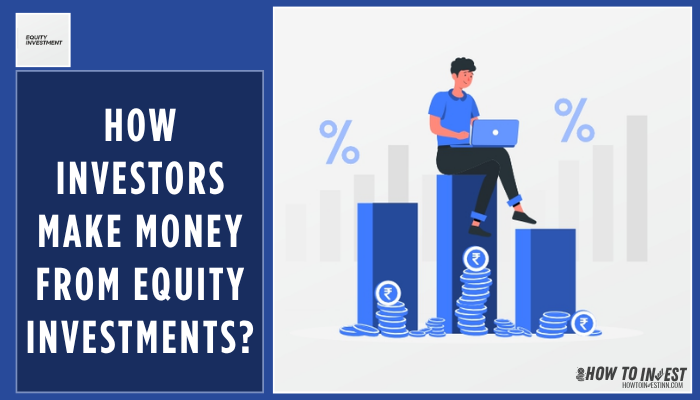Do you know how investors convert their equity investments into profit? If you don’t know about this, then get to know in this detailed guide regarding how an investor makes money from equity investment. For this, you have to understand the mechanism of equity investment and why it is important for investors.
Moreover, this article will explain to you the primary methods investors can adopt for making money from equity investments. These equity investments may include buybacks, capital gains, dividends, etc. It will be helpful for the investors in getting a good amount of money in return for their investment.
Understanding Equity Investment
An equity investment comprises purchasing the shares of a company. After purchasing the shares, you will receive partial ownership of the company. This ownership will help in entitling you to a specific portion of the company’s profit. Furthermore, the equity investment can occur in numerous forms, including mutual funds, stocks, and exchange-traded funds.
The investors can easily choose from the numerous kinds of equity investment, and they will get a high return on their investment. Along with this, it is more preferable apart from the other investment types, which comprise higher risk.
How Investors Make Money from Equity Investments?
These are some of the main methods that are used by investors to earn good income from equity investments. You can easily invest in any of these types and get a profitable return.
1. Capital Gains
Capital gains occur when an investor sells an investment for more as compared to the amount he has paid for purchasing it. For example, if you have purchased a stock at $50 and now you are selling it at $70, then your capital gain will be $20.
This capital gain can be short-term or long-term based on the market fluctuations. Along with this, the long-term gains are more preferable because they have less tax on them. So, the investors mainly aim for capital gains by selecting the stocks that are very valuable in the market and will rise over time.
2. Dividends
Dividends comprise a portion of the company’s earnings. They are mainly distributed to the shareholders, and the period is mostly set on a quarterly basis. The dividend provides a good income stream for the investors. Moreover, they can also have an opportunity for being reinvested in purchasing more shares. This will help the investors in getting benefits from the compound growth.
So, there are various companies that pay dividends consistently and are financially stable. And the investors can avail this method in order to get a good return from the equity investment. Additionally, these dividends can be in the form of additional shares or cash payments, which will be helpful for the investors in earning a good revenue.
3. Acquisitions
If another company acquires a company, the shareholders can receive a premium on their shares. This will help them in getting profitable returns. So, the acquisition or merger can help the investors in getting good, profitable earnings. In this way, they can leave other equity investments.
Risks Associated with Equity Investment
Here are some of the risks that are associated with investing in equity. So, the investors must be aware of the challenges before investing in any type of asset.
- It can cause losses, which can occur because of market fluctuations.
- The liquidity risk can also appear in the case of equity investment, in which you cannot sell your investment according to your preferred price.
- There can be a company-specific risk as well, which is because of the performance of that specific company in which you have done the investment.
- The economic fluctuations and the political instability can also have a harmful impact on the investment market, which will be harmful for the investors.
After becoming aware of the challenges and risks, you can easily help in reducing the potential losses and make informed decisions.
Strategies to Maximize Returns
You can easily enhance your investment return by following various strategies. If you adopt all these strategies efficiently, then it will be helpful for all the types of investors.
- Portfolio Diversification:
If you diversify your portfolio, it will help in spreading your investment, and this will help in reducing the risk associated with that specific investment.
- Long Term Investment:
You can do long-term investment. This is because there is less tax on long-term investments. It will also help in providing you with more capital gains according to the market conditions. Along with this, it will also provide you with compound return.
- Portfolio Reviewing:
It is also an important strategy to review your portfolio regularly. This will help in adjusting your investments. Also, it will provide you with complete insights regarding the performance of your investment.
FAQs
1. What is the difference between capital gains and dividends?
Ans. The dividends are the regular payments that are provided by the company from its profits. At the same time, capital gains are the profit that is received by the investor when they sell an investment at a high price.
2. Can I rely only on dividends for my income?
Ans. There are many investors who focus on dividends for income. But it is suggested that you should diversify your investment.
3. Are equity investments suitable for all investors?
Ans. Equity investment provides you with high returns. But there are high risks associated with them. So, the people who are not ready to take risks should not invest in equity investments.
4. How can I reduce the risk in the equity investment?
Ans. You can easily reduce the risk by diversifying your portfolio, long-term investment, and remaining updated about the market conditions.
Wrapping Up
After understanding how to make money from the equity investment, you will come to know about mitigating the risk. It will also help you in strategizing efficiently for maximizing revenue. So, you should consider your financial goals, risk tolerance, and experience regarding your investment strategy. As a result, it will provide you with financial benefits and good return on your investment.



